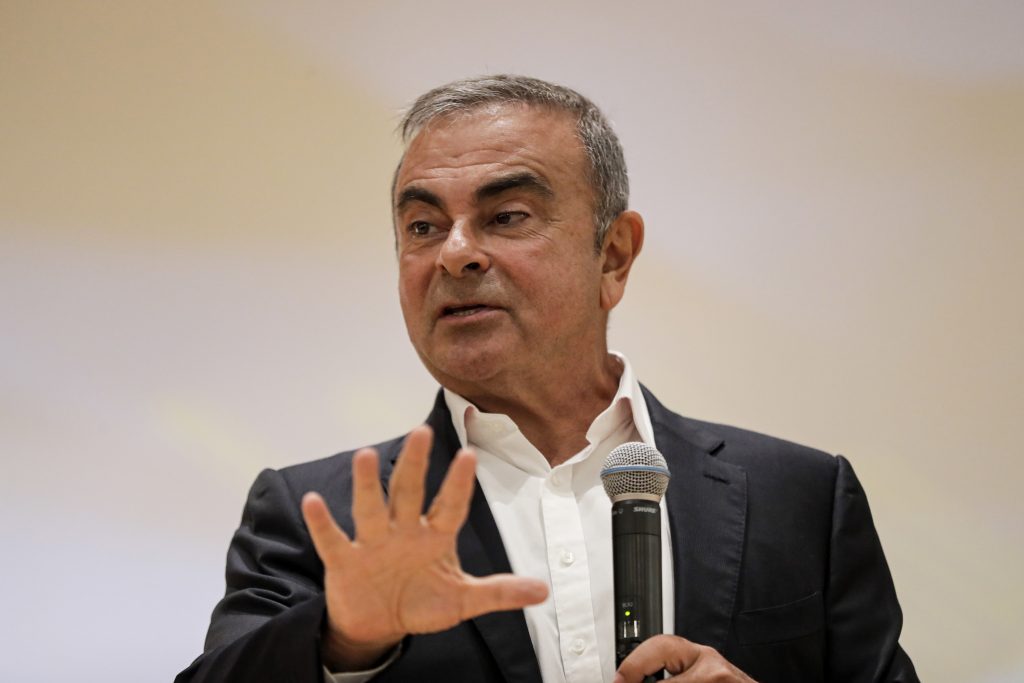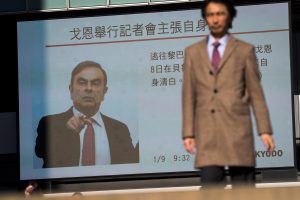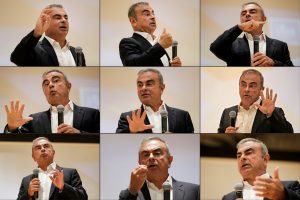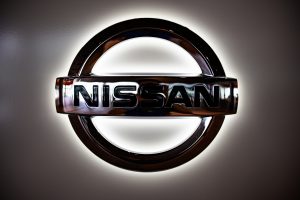
- ARAB NEWS
- 14 Jul 2025

In a special interview for Arab News, Carlos Ghosn makes revelations on the occasion of the release of his book “The Time of Truth”
“Anyone who says France has not let go of me, has not followed this story, has not understood it.”
Elsa Yazbek Charabati
Carlos Ghosn, which truth was the hardest to admit?
There is not just one, there are many truths, rather hard realities to admit. It is the fact that I dedicate a very large part of my professional life to a company which was given for dead. So 17 years of general management of Nissan – since I gave up this position at the end of 2016- in a country that is not particularly known for being ungrateful, and there all of a sudden: this shock, this treatment, this hatred, this revenge.
The second reality is the abandonment of France. I had not gone to Japan as a tourist, but as the boss of a large French company, as the boss of an Alliance in which French interests were dominant.
All of a sudden, a few days later, they say: “France’s best interests are to preserve the Alliance and relations with the Japanese.”
And I was abandoned on the side of the road.
How did a fine fox like you, known for his flair and vision, see nothing coming?
You always have doubts from time to time, you are careful…, but it is true that I was surprised by all the action. Even if there were to be misunderstandings on, in particular, the salary commitments that could be made after retirement which were neither decided nor paid, I never would have imagined that there would be an arrest on something of this type, that was the shock. In fact, the arrest is not for that.
It’s a huge hoax.
The arrest was due to the Japanese saying, “We’re fed up with the influence of the French state over Renault and the demands that the French administration makes on the Japanese. And they recognized very quickly that the only way to cut that influence was to get me out.
So you are the scapegoat?
I don’t know if I am a scapegoat or not, but there was a movement that took place. It could have been done in a different way, I am firm, decisive, but not a supporter of strong manners. (…) I knew very well that if the Japanese no longer wanted this Alliance, it would be very difficult to keep it alive.
So they could have told me right away, I would have gone out, we would have spared all this destruction. Because, of course I am a victim, but it’s not just me. Nissan as a company is a victim and Renault as a company is a victim. All the little geniuses who set up this operation, (…) I hope one day that they will be held to account.

Carlos Ghosn, in a matter of minutes you went from a character to … a “deal”. How can you summarize this matter?
First, it’s a bad deal and for me it’s a conspiracy, it’s a scheme that has been done very well. It starts from a small group that links the Japanese government to the Prosecutor, with the collusion of the Japanese press which quickly rallied, making 180 degrees. Until my arrest, it was all praise and then all of a sudden in 24 hours it was over.
I had become the bad duck, the greedy dictator. This is the description given to a surprised Japanese audience. I spent several months in Japan after my arrest and when I was walking around Tokyo, people were always very nice to me as if nothing had happened. They were surprised to see how this person who for 17 years was presented to them as a “role model” suddenly becomes a plague victim who did all these despicable things, who had absolutely horrible management, when – as you know – several management books have been written, that there were references. It does not hold water.
Writing this book is a catharsis for you?
I did not make this book to cure myself; I made it because I find that there have been so many lies and manipulations with the complacency of the international press, that it was necessary to have, somewhere, solid elements that come to tell things as they happened. The truth always triumphs in the end.
There is not only this book, there is a second one that comes in March / April which is different, and then there is a documentary television series, and a fiction television series, because this story is extremely rich, very complex and it involves several aspects of the times we are living in.
In this whole thing, is there a moment that revolts you the most?
The way my family was treated: it’s incomprehensible.
Which question was the most sensitive of your interrogation?
There was no sensitive question, there was this refrain from the prosecutors: “you better confess because if you do not confess on this charge, there will be others … and if you persist in this attitude, we will look for your wife, your family… ”. In fact, you know that even if there is nothing against you, when your name appears in the press with suspicion, the damage is already done.

It is the “character assassination” you’re talking about …
Yes, but “collective character assassination”
This system is called the “hostage system” in Japan – and the term is not mine, it was adopted by the United Nations, since the United Nations has already questioned the hostage system in Japan, 4 years ago.
What is absolutely shocking in this case is that Japan obtains international agreements, including free trade with Europe on the basis of respect for human rights. So we sign and we don’t respect. It’s a fool’s business.
How did you experience this “fall”?
I fell out of a system where I had three companies with a year-round timed program, and suddenly nothing. You are in a prison, you have nothing, you have no watch, no belt, you have a few books, you are in your cell, and that’s it, overnight. The shock is very hard. But you have to adapt, it happened.
Daily “leaks” in the press, orchestrated by the Tokyo prosecutor in … your escape, the run of the century that you masterfully orchestrated. What a revenge for you. How did you feel about it?
Honestly, I didn’t leave Japan out of defiance; I left out of desperation, the desperation of justice. There was a death sentence that had been pronounced somewhere in Japan, they were executing it. It’s not a spectacular death: well, we put you in prison, it takes 5 years to judge you, they ruin you, they ruin your reputation and they will not let you speak.
It is the cynicism of the Japanese prosecutor in collusion with the Old Nissan and also with members of the Japanese government – we must not forget this component: never a case of this type would have been done without the complicity, if not at least the initiative of the Ministry of Industry which is very powerful in Japan.
The Juffali case was discussed, but also the Oman case which allowed the prosecutor to send you back to prison. Why this hype on Gulf personalities in your opinion?
First, they know my oriental ties; I used to come to Lebanon quite often to deal with oriental affairs.
Then there was great sympathy for me in the Arab world, I was one of the few great business leaders from the Arab world. So they would have found a Japanese dealer, it wouldn’t have been as dirty as finding a Saudi or an Omani.
They did it knowingly because they knew I had friendly relations with a number of them. But this is not a compromising friendship, they are very good distributors, very good businessmen and that is not disputed at all. They did this to introduce a bit of a shady side, thinking: “In the Middle East, relations are not as clear as in other countries.” They used that, it’s very well done. You know it was put together with the collaboration of companies specialized in reputational demolition. And it cost a lot of money. According to Bloomberg, more than $ 200 million were spent by Nissan, for damage supposedly of $ 5 million.

What is your message to the Japanese?
My first message to the Japanese is that the real person is not who they have described him to be, but who you have known for 17 years. My second is that Japan cannot continue to be a great economic power and a country that people visit with pleasure if the hostage system is not abolished. And besides, there are a lot of people in Japan who ask for it.
According to what you say in this book, you were stabbed in the back by Japan and let go by France. Ultimately, it was in Lebanon that you found refuge. So this is the only country you can count on?
It’s a fact, I can’t deny it. The President of the Lebanese Republic has held a very courageous stand, even though he has no particular political interest in this matter. I was boss of Renault, boss of Nissan and not boss of a big Lebanese company. He is the only one who held position, who questioned the Japanese authorities, the Japanese ambassador. He’s the only one my wife has seen. No French official received her except former President Sarkozy who was remarkable in this case. Anyone who says that France has not let go of me, has not followed this story, has not understood it.
“And if I am in Lebanon today, among other things, it is because I felt a sincerity, an authenticity on the part of the Lebanese authorities to say: “This man, what did he do to you? “